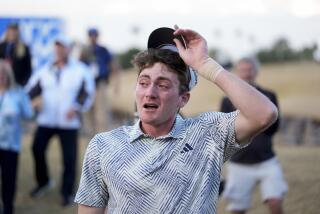Success Still Foreign Here
AUGUSTA, Ga. — A little oompah-pah music, professor. Fire up the glockenspiels. Give us a chorus of “Edelweiss.” Write golf with an umlaut. Let’s hear it for the Vaterland.
Bernhard Langer has the game surrounded down here at the Masters. Its position is untenable. It is expected to come out with a white flag today and negotiate the terms of surrender. Langer waltzed through its puny defenses and blasted Augusta National with a 69 on a day of blustery winds, wet fairways and unconscionable greens. He threw a little 69 at it on a day when 75 was a good score and the man thought to be his chief enemy, Nick Faldo, shot himself in the foot with a grungy 79. There were only two scores below 70 and Langer’s was one.
It should come as no surprise to anyone with a working knowledge of the game that a European is leading the Masters. They have won four out of the last five and eight out of the last 15.
It used to be winners of the Masters had the twang of Texas or the sing-song cadences of the Old South in their acceptance speeches. Now, they have the burr of Scotland, the nasality of Britain or the guttural precisions of Prussian.
If he wins today, it will be the second for Herr Langer. He has won two tournaments in this country--and one of them was the ’85 Masters. Nick Faldo has won three tournaments in this country--and two of them were the Masters. Seve Ballesteros won six tournaments in this country--and two were Masters. Sandy Lyle won five tournaments in this country--and one was the Masters.
You’re supposed to learn golf hitting acorns with twigs in the hills of Virginia as Sam Snead used to do. Or you might have it handed down to you in the highlands of Scotland or the dunes of England.
How do you learn it on the parade grounds of Deutschland?
Bernhard Langer learned it well. Winner of almost 40 tournaments worldwide, he is one of the best strikers of the ball on any fairway anywhere. He plays slowly, methodically and probably never hit a shot he hadn’t had a staff meeting with himself before addressing it.
Langer attacks the golf course at its weakest points. And Augusta doesn’t have too many of these. On a day when the leader boards were a smorgasbord of 78s, 79s, 75s, and even an 84, Langer shot a 69. Under the circumstances, it was, he agreed, one of the five best rounds he had ever played.
The victory was otherwise really the course’s. Competitors were squandering shots like a sailor on leave for the first time in a year.
First, there was the pride and joy of every southpaw in the country, Russ Cochran. A left-hander winning the tournament would be even bigger news than a German winning it. And, turning onto the back nine, Russ was eight under par to Langer’s 10 under. By the 16th hole, Langer was still 10 under, but Russ was only 4.
Cochran appeared to lose his rhythm after he had missed a four-foot putt for birdie on the malicious 12th hole.
But it was the 13th hole that really demolished the field at Augusta Saturday.
No. 13 is a pastoral little par five, serene with lordly pines lining its dogleg fairway. It is only 465 yards long. Most places, that is a par four.
This hole made hash of the leaders. Jeff Maggert, who started the day in the lead, bogeyed it. Raymond Floyd double-bogeyed it. Chip Beck bogeyed it. Even Langer bogeyed it. There were only 14 birdies out of 61 players.
What No. 13 didn’t do to the field, No. 16 did. There was only one birdie on it all day. An innocent-looking par-three over water surrounded by an organ loft of sighing pine trees, it had the best golfers in the world looking like a dentists’ four-ball at Griffith Park.
Langer had five birdies and two bogeys. Those closest to him at the close of business Saturday were Cheerful Chip Beck, who could see something nice in the Johnstown Flood, and Dan Forsman, whoever he is.
Forsman got within two shots of the leader after 15 holes when he suddenly decided to poke a four-iron through the curtain of wind surrounding the 170-yard 16th. Forsman, as he put it later, “airmailed” the green--that’s golfers’ jargon for overflying it like a jet. He chipped back spastically, and, when his ball finally did light on the green, it raced down a slope like Jean Claude Killy down the Matterhorn. He ended up with a double bogey. On No. 18, he drove into a bunker, topped his sand shot (even as you or I) and suddenly was scrambling to make bogey.
So, the German juggernaut has an open road ahead. He has to come from ahead. For a canny veteran, this is usually a walk on the beach. The others have to take all the chances.
It Langer wins--and that might be the way to bet--that will be five out of six for the Europeans. They either have to tighten the immigration laws or stop visiting work permits.
As for Germans, we are accustomed to letting in field goal kickers, race drivers and, here and there, a basketball or soccer player.
There are now 365 golf courses in Germany and 200,000 golfers. When Bernhard got his first set of clubs 25 years ago, most people thought he had come to fix the plumbing. Now they want to know if he can get them a starting time at St. Andrews--or a season ticket to the Masters.
He will be the siegmeister Sunday night if the American saboteurs can’t do anything about it.
“I think I know this terrain very well,” he said. “I have been out here 17 years and at the Masters 11. You always worry somebody might have a great round and get you. What you have to do is have a good enough round so they keep their distance.”
He did just that on Saturday.
More to Read
Go beyond the scoreboard
Get the latest on L.A.'s teams in the daily Sports Report newsletter.
You may occasionally receive promotional content from the Los Angeles Times.










